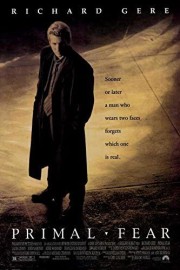Primal Fear
Whether you buy into “Primal Fear” depends, largely, on how you react to the performance by Edward Norton. I remember my mom going to a Women in Film meeting and they had William Diehl, the author of the novel this film is based on, there to talk about film adaptation and performances, and he had a lot to say about Edward Norton, who had blown them away with his audition to play Aaron Stampler, the key figure of the narrative. It was Norton’s first film- and the first of three films we’d see him in in 1996- and it netted him a well-deserved Oscar nomination. There is a revelation about the character at a crucial moment in the film that shifts the entire narrative, and then builds to the ending, that, if Norton does not pull it off, the film doesn’t work. Even now, Norton’s work feels exciting and adventurous, and even a bit sympathetic.
Like a lot of courtroom dramas in the 1990s, the film revolves around a thorny social issue case wrapped in crime, but this is much more about the crime. The film’s protagonist is Martin Vail, played by Richard Gere, and this is the type of slick, arrogant character Gere excels at playing; he’s a big-ticket lawyer who’ll defend just about anyone, whether it’s a mobster or the young, innocent 19-year-old who killed a beloved archbishop in Chicago. Throughout the film, he is being interviewed by a reporter, and we get the picture of him going after either fame, or money, with every case he decides to take. He takes Aaron’s case because he knows this is going to be a big murder case, not necessarily because he believes Aaron is innocent, although he does start to think so. Meanwhile, the prosecution- including the Chicago DA (John Mahoney) and a former lover (Laura Linney)- is preparing for a slam dunk.
As with John Grisham’s stories, “Primal Fear” is pure pulp potboiler, and director Gregory Hoblit does an interesting job just going for the pulp aspect of it. The murder of the archbishop is brutal, and shown quite graphically; Stampler’s clothes are soaked in blood; there’s rougher language than we’re used to in a major studio crime drama; and finally, a revelation about the archbishop that comes through in a somewhat graphic videotape. At the time, the idea of Catholic priests committing sexual abuse wasn’t as internalized as part of the culture as it is now, but it was enough so to where, even if you don’t practice, you understood how big a deal it was, and why that doesn’t necessarily work in Martin’s favor when he and his team uncovers it. But by that point, we know Martin is going to figure out a way to make it work to his advantage, and it builds up to a fairly predictable moment that doesn’t make it land with any less of an impact.
There’s not really an imperative that says that I have to hold back spoilers for a 25-year-old movie, but in the case of “Primal Fear,” I think the big revelation about Aaron’s character is important to experience in real time during the movie. Part of that is because it’s a multi-tiered reveal, with pieces of it at a time, and part of it is because it’s exciting to see Norton play the character fully, in all the ways he is presented, through the end to savor it. It’s also exciting to see Gere try to shift his strategy mid-stream with this new information, and he and Norton are excellent together.
I’ve always enjoyed “Primal Fear.” It was a nice change-of-pace in an era of courtroom thrillers, along with a great showcase for talent like Gere, Norton, Linney, Mahoney, and Frances McDormand as a neuroscientist and Alfre Woodard as the judge on the case. The screenplay by Steve Shagan and Ann Biderman is smart and knows what it’s trying to do, and the score by James Newton Howard is solid work by the composer. If you haven’t seen it yet, and your a fan of some of those names, it’s worth checking out.










